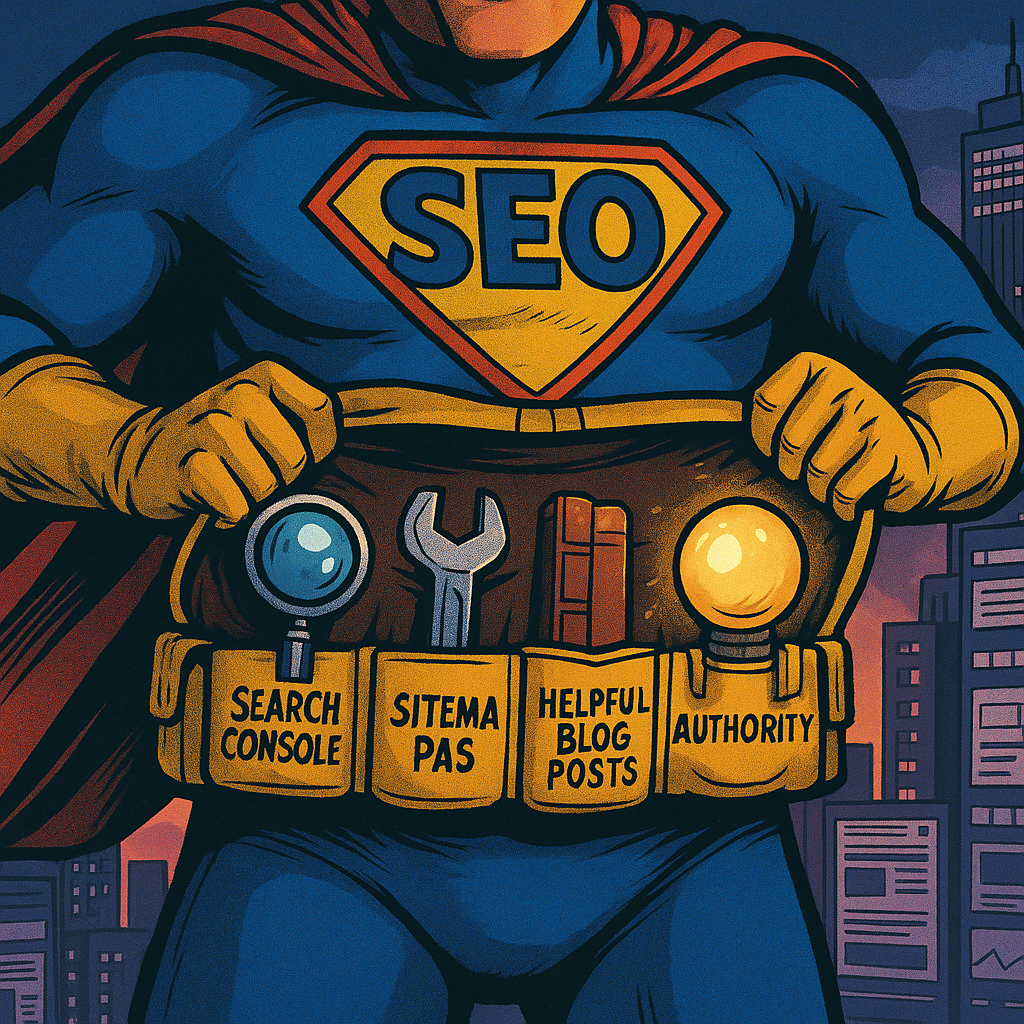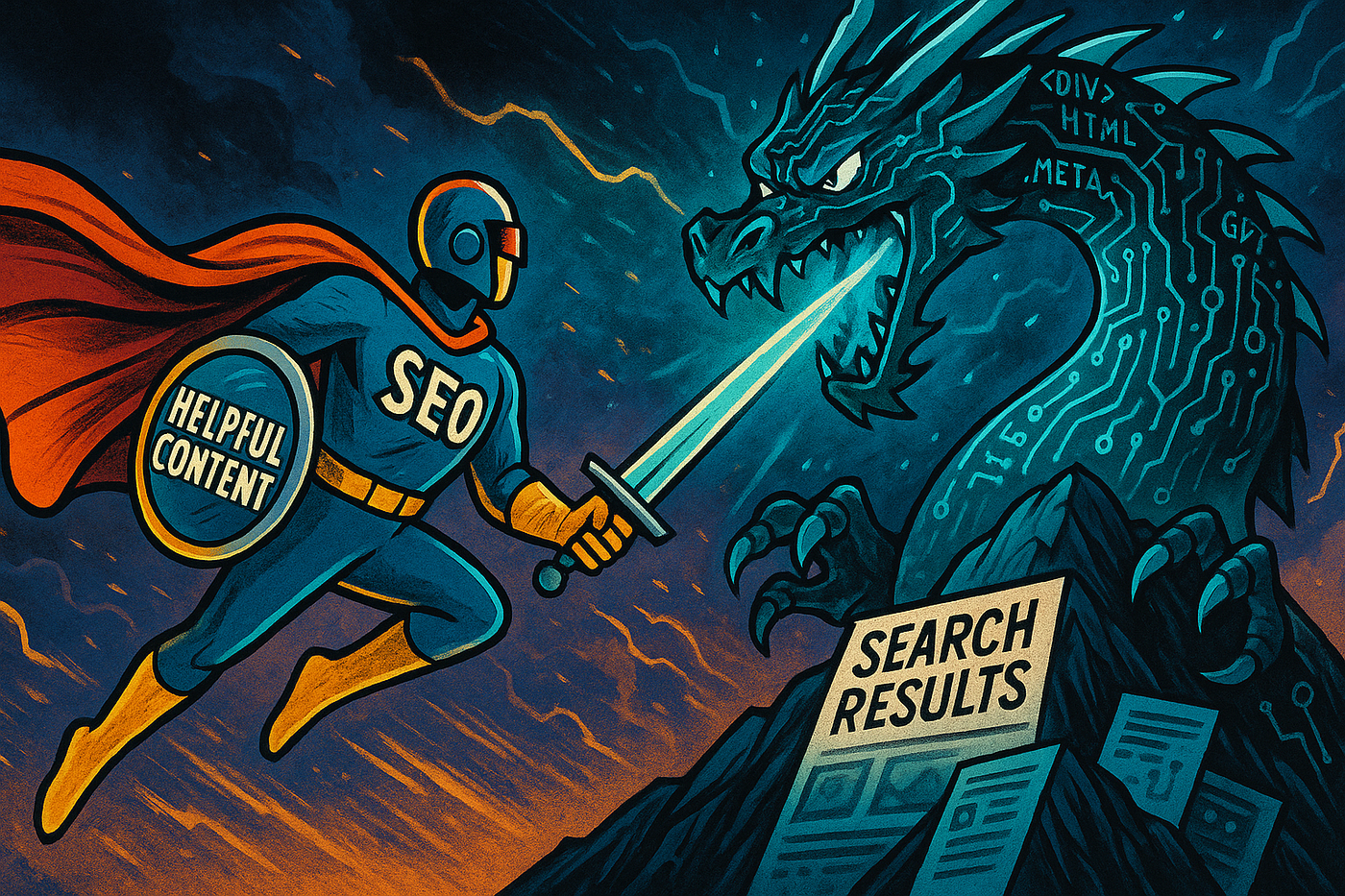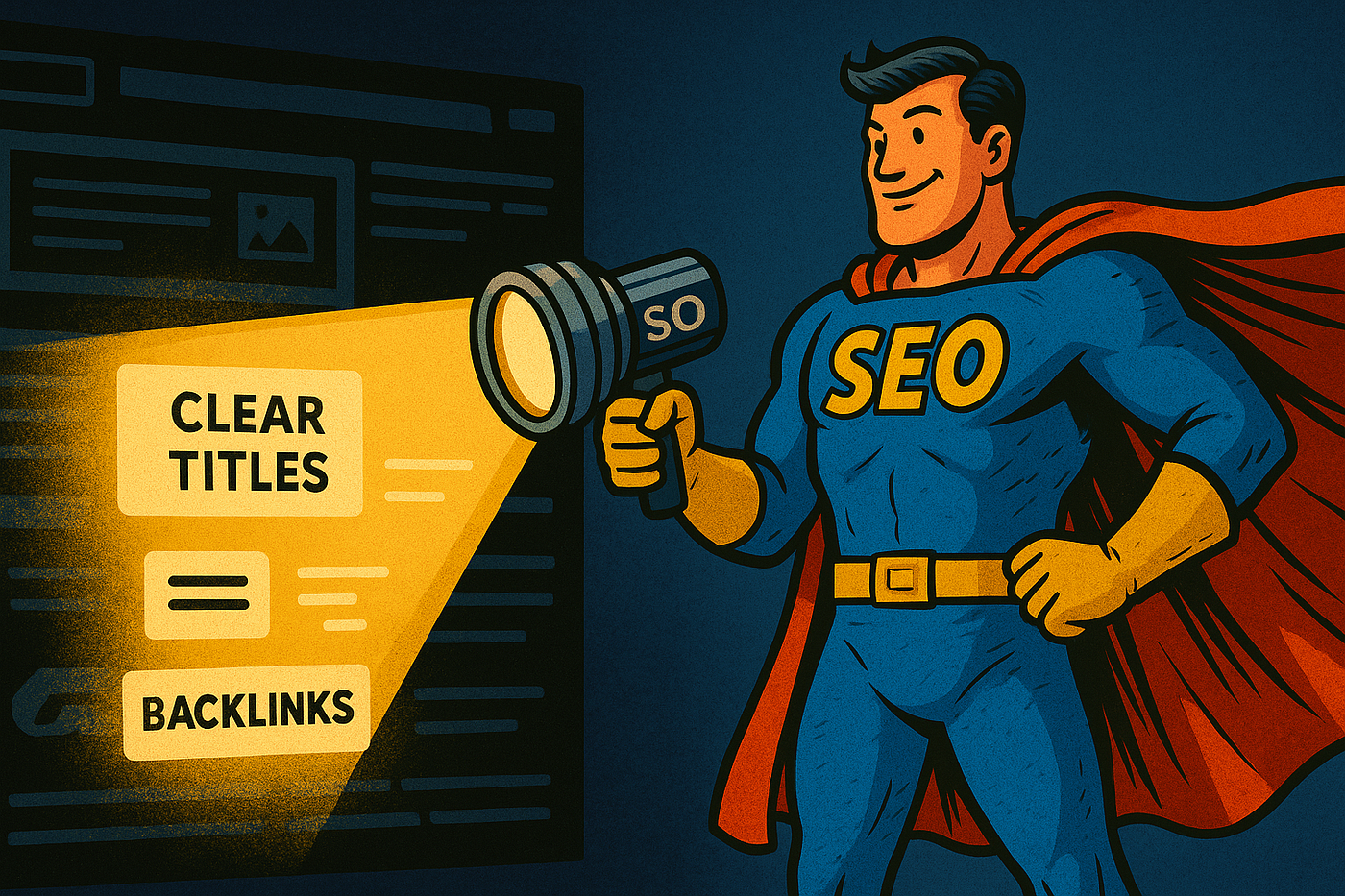The Only SEO Guide You’ll Ever Need (No Tech Degree Required)
You built a website. You poured your heart into it. Now you’re wondering: how the hell do I get people to find it?

Welcome to SEO — Search Engine Optimization. It’s not magic. It’s not a hack. It’s about making it easy for search engines (like Google) and real humans to discover your content.
This post is your no-fluff, no-fuss starter guide to understanding how search works and what you can do to get your site seen.
First, What Even Is SEO?
SEO isn’t just about ranking anymore — it’s about getting referenced.
Yes, SEO still means helping search engines (and now, large language models like ChatGPT and Perplexity) understand your content. But the game has changed.
It used to be about claiming that #1 spot on Google. Now, with Google’s new AI Overviews appearing at the top of many search results, that spot doesn’t matter as much, because people might get the answer before they ever click.
The real win? Being the source behind those AI-generated summaries.
Most sites that appear in AI Overviews are also ranking on the first page. That’s a strong signal that classic SEO fundamentals still matter: clear structure, technical soundness, and high-quality content.
But here’s the catch — AI Overviews often reduce clicks to traditional search results, especially for quick, informational queries. That means:
Visibility ≠ traffic.
So what do you do?
Start with research. Before launching a content plan or reworking your site, study how AI Overviews show up in your niche.
- What questions are being answered by AI directly?
- Who is getting referenced?
- Where can your voice add more value?
In this new era, the best SEO strategy is to become the source everyone else quotes, including the bots.
How Google Finds Your Site
Here’s the good news: you don’t need to “submit” your site to Google. Its bots are crawling the web 24/7, looking for pages to add to the index.
Here’s the better news: you can help them find and understand your site faster.
- Check if you’re already in Google: Search site:yourwebsite.com. If stuff shows up, you’re in!
- Use a sitemap (optional): If you’re using WordPress or another CMS, it might already create one for you.
- Build links: Google finds most sites through links from other sites. Share your stuff. Promote it. Guest post. Get involved.
Make Your Pages Understandable (To Google AND Humans)
Google sees what users see — if you block parts of your site (like CSS or JavaScript), you’re making it harder for bots to read the page properly.
Here’s how to keep things clear:
- Don’t hide important elements behind logins, pop-ups, or weird redirects.
- Use the URL Inspection Tool in Google Search Console to see how Google sees your page.
Organize Like a Librarian (Not a Hoarder)
Structure matters. Here’s how to tidy up your site:
- Use folders/directories to group similar content (/blog/, /products/, /promotions/).
- Use clean URLs: /cats/care-guide is way better than /p=2893471.
- Avoid duplicate content: If two URLs show the same content, pick a “canonical” one and redirect or use rel=”canonical” tags.
Content Is Still King (But Context Is Queen)
You’ve probably heard the acronym by now: E-E-A-T — Experience, Expertise, Authoritativeness, Trustworthiness.
It’s not a magic checklist or a direct ranking factor. But it does shape how Google — and now AI Overviews — judge your content.
If AI is pulling answers from your site, you need to be someone worth quoting.

Here’s how to build real trust:
- Add author bios with credentials or lived experience. Show you’re not just recycling info — you’ve been there.
- Link to credible sources. Don’t be the only one saying it. Reference experts, data, and case studies.
- Keep your site clean and legit. Use HTTPS. Ditch shady popups. Add clear contact info and privacy policies.
- Speak from experience. Opinion is fine, but back it with firsthand stories or proof of work.
And don’t forget the basics that make people want to read:
- Keep it easy to digest. Short paragraphs. Clear headings. Bullet points. No walls of text.
- Make it original. Don’t reword someone else’s post. Bring your voice, your scars, your wins.
- Keep it current. Update old content, prune what’s outdated, and always aim to stay relevant.
- Write like a human. Not for bots. Not for checklists. Just imagine explaining it to a friend who cares.
Think Like Your Reader
What words would someone use to find your content?
Some people search for “budget-friendly honeymoon spots.” Others type “cheap romantic vacations.” Same intent, different language. Think of all the ways your audience might phrase something.
But don’t obsess over cramming every keyword in. Google’s smart. If your content is solid, they’ll get it.
Don’t Let Ads Ruin the Vibe
Nobody likes sites overloaded with pop-ups and flashing banners. Google doesn’t either.
Use ads sparingly. Keep the user experience front and center.
Link Like a Pro
- Internal links help users and search engines navigate your site.
- External links to trusted sources build credibility.
- Use descriptive anchor text (instead of “click here”).
- Watch for spammy links in user-generated content. Add nofollow tags where needed.
Visibility Beats Clicks: Why Being Cited Matters More Than Ever
A lot of businesses are waking up to the same gut punch: Search-driven traffic is down. Especially for top-of-funnel content that answers simple questions or offers broad overviews.
Why? Because Google’s AI Overviews are giving users instant answers. No click required. Your content might be cited, but the traffic doesn’t always follow.
But…even though AI Overviews might not drive traffic, they build trust.
Even if users don’t visit your site, they’ve seen your name. They’ve read your words. That brand impression sticks.
So this is the new game:
- Be visible — even without the click.
- Write content that’s quotable. Clear, bold, and unmistakably you.
- Put your name or brand in the content. So when it shows up in an AI summary, they remember who said it.
You’re not just writing for search engines anymore. You’re writing to be remembered.
Meta Titles and Descriptions: Still Worth Getting Right
SEO used to be about three things: Meta Titles. Meta Descriptions. Meta Keywords.
Those little snippets under your link? They were gold. You could optimize them, tweak them, and watch your click-through rate climb.
Then Google got smarter.
By 2020, Google was rewriting 70% of meta titles and descriptions. Why?
- To boost CTRs for lower-ranked results (positions 4–6).
- To fix vague or irrelevant titles that didn’t match search intent.
- To fill in gaps where SEOs ignored long-tail keywords.
Google doesn’t rewrite your titles to be cruel. They do it because most of them aren’t good enough.

How to Write Better Meta Titles and Descriptions in 2025:
Meta Titles
Your <title> tag should be:
- Descriptive and concise (aim for 50–60 characters)
- Unique to each page
- Free of keyword stuffing
- Clear about what’s on the page
Bad: Home
Better: Affordable Dog Training in Austin, TX — Bark & Learn
Pro tip: Most CMS platforms auto-generate title tags from your post titles. Don’t blindly trust them. Double-check and customize for clarity and impact.
Meta Descriptions
This is the summary that appears below your title in search results. Even though Google often pulls from on-page content, a strong meta description can influence what gets shown and improve clicks.
Best practices:
- Aim for 150–160 characters
- Write a compelling summary, not a keyword dump
- Include your main topic or phrase, but use natural language
- Make sure it reflects what’s on the page
Bad: Best digital marketing agency. We offer services. Call now.
Better: Need more traffic? We help small businesses grow with SEO, ads, and smart web design — backed by real results.
Images and Videos Matter, Too
- Use high-quality images that support your content.
- Add descriptive alt text so Google knows what the image is.
- Place images near relevant text for better context.
- For videos, treat the title and description like blog content. Be clear. Be specific.
SEO Strategy Must Adapt to Search as a Service
AI Overviews on Google aren’t just a cosmetic change — they signal a shift in how people use search.
Search is no longer just a referral engine. It’s becoming an answer engine. Users don’t want a list of links — they want instant, accurate answers. And Google is delivering those with AI-generated summaries pulled from top-ranking sources.
So… What Does This Mean for Your SEO Strategy?
- Optimize for visibility, not just clicks. You may not get the traffic, but being referenced in an AI Overview or chatbot result still builds trust and brand recognition.
- Capture attention after the click. Once someone lands on your site, don’t let them bounce. Use lead magnets, email opt-ins, and communities to turn casual readers into long-term fans.
- Expand your reach beyond Google. Platforms like Perplexity, ChatGPT, and even Reddit are becoming search engines in their own right. Make your content accessible and useful across those channels too.
- Think like a product manager, not just a content marketer. Your website should deliver real value on its own, not just as a gateway from search. Build tools, resources, or experiences that users come back for.
Promote Like You Mean It
You can have the best site on the planet — but if nobody knows it exists, it won’t matter.
Promote via:
- Social media
- Forums and communities
- Email newsletters
- Word of mouth
- Your physical marketing materials (business cards, brochures, etc.)
Just don’t go overboard. Spammy promotion backfires — both with users and search engines.
What Not to Waste Time On
- Meta keywords: Google ignores them.
- Keyword stuffing: Annoying. Outdated. Spammy.
- Exact-match domains: Not a ranking factor anymore.
- Page length: There’s no perfect word count.
- Perfect heading structure: Nice for accessibility, but not a ranking signal.
- Obsessing over E-E-A-T as a “ranking factor”: It’s a framework, not a checkbox.
Final Thoughts: SEO in the Age of AI
If you remember one thing from this guide, let it be this:
To be successful in this new era, you must focus on:
- Building a direct relationship with your audience
- Monitor AI Overview appearances (and LLM appearances)
- Double down on brand, structure, and author credibility
Make good content. Keep it organized. Help people find it. That’s 80% of the battle.
Then slowly, over time, build up your presence with:
- Links
- Content updates
- Promotion
- Smart technical tweaks
Search engines will catch on. So will LLMs.
Written by P. Shah — helping creators and entrepreneurs stay ahead of the curve in a world run by algorithms.
Subscribe to more insights at shahp.substack.com